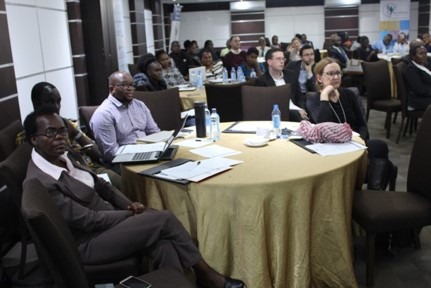Multi Stakeholder Partnership (MSP) meets to strategize on how to fill the identified gaps in the pre -identified specialized cadres.
On January 26th 2018, the MSP carried out an introductory meeting where three specialized cadres were shortlisted namely; Health Records and Information Officers (HRIOs), Community Health volunteers (CHVs) and Emergency Care Professionals (ECPs). Since then, these Cadres have had several meetings to a lay foundation on how they will be strengthened.
On the 23rd March 2018, the MSP organized the second large stakeholder meeting at Four Points Hotel by Sheraton – Hurlingham to highlight the gaps within the three specialized cadres and agree on a way forward to fill those gaps.
“Lack of qualified professionals and machinery to institute emergency care, contributes to a major cause of deaths in Kenya where 54% of the annual deaths can be addressed by establishing pre-hospital and emergency care” Dr. Benjamin Wachira – Emergency Medicine Kenya Foundation.
A case study in nyamira county shows that there is no emergency care attention at county level, therefore patients have to either be airlifted to Nairobi or travel by bus, to seek emergency medical care. The Emergency Medical Care policy draft has been completed and the government intends to release it this year.

CHVs in Kenya are very important in teaching the community how to improve healthcare and change behavior at a household level which will inturn prevent illnesses. Moreover, CHVs are a major link between health systems and the consumer.
It was noted that there is no associations available for CHVs. Dr Amit Thakker – Chairman – Kenya Healthcare Federation, explained that there is no regulators concerned with the scope of work of CHVs and further recommended that there is need to bring this regulations on board.
HRIOs are very vital in health record keeping and the data should be correctly captured because it should give a clear picture on the healthcare position in terms of progress. “Life begins and ends with health records and information officers” said Mr. Kennedy Auma – Association of Professional Coders/Chair – KHF Human Resource for Health Committee.
It was noted that the Health Records and Information Managers Act 2016, has been approved but not implemented and the Act includes establishing a Health Records and Information Managers Board.
An observation from Kiprono Chepkok – CEC, Health Elgeyo Marakwet, shows that Health records and data should be accurate, the existing data is incorrect since it has been derived from the Ministry of Health and not from the county directly.
Moreover; “there is need for easy access to health information and care in all counties to avoid/reduce medical travel within the nation” Ruth Koech – CEC Health, Nandi County.
There are training gaps and opportunities within the three cadres where Kenya Medical Training College (KMTC) has been the main trainer of most health care workers in the country. There are 148 health training institutions accredited by the health regulatory agencies as at 2015 to train various health professionals to meet the growing demand for quality healthcare in the country. He futher said that training is important because competency based training leads to access to quality healthcare.
There are training institutions distributed in 36 counties out of 47 counties in Kenya and out of these 36 health training institutions, only 14 are government sponsored colleges.
It was noted that there is lack of curriculum standardization and the Private Sector can help the Training Institutions e.g. KMTC to review their curricula, because there is need to saturate the market with Trained Professionals in order to prevent brain drain.
Dr. Amit Thakker shed light on Health Regulatory Bodies and Associations in Kenya. He stressed on the need for cadres to have Regulatory Bodies and form Associations. Moreover, this is a requirement by the Act of Parliament to establish the Regulatory Board (HRIOs).
Kiran Nyotta – KHF legal and policy expert, explained how the Health Act could impact specialized health cadres where the Health Act 2017, was enacted to consolidate the Kenyan health system and includes provisions to regulate healthcare service delivery and providers.
She reiterated that the Kenya Health HR Advisory Council (The ‘Council’), will be formed under Part V of the Act which will deal with establishing norms and standards for healthcare professionals and will maintain a master register of all health practitioners in the counties.
The Council’s Board will include 2 representatives from Health Professional Associations who are not regulated or registered by any regulatory body. Therefore, the specialised heath cadres can take advantage of this provision by forming an Associations so that they can contribute to the Council deliberations.
Kiprono Chepkok – CEC Health Elgeyo Marakwet put forward that there is no direct link between the counties and Regulatory Bodies and the link is very important. Ruth Koech – CEC Heath Nandi County emphasized on the need to establish a body that can accredit all the ignored cadres.

A consensus was reached on the three cadres in that the Emergency Care Professionals should be recognized and increased access to training with excellent curriculums will strengthen the cadre in the health workforce. It was further agreed that any future steps should be aligned to the ECP policy which has been launched by the Ministry of Health.
It’s important to enhance and update the HRIOs curriculum structure whereby advocacy for the implementation of the Health Records and Information Managers Act 2016 shall strengthen the cadre.
More advocacy and discussion on the CHVs renumeration should be done at a policy level in order to strengthen the cadre moreover, formation/strengthening of an Association or training incetives could motivate this work force.
